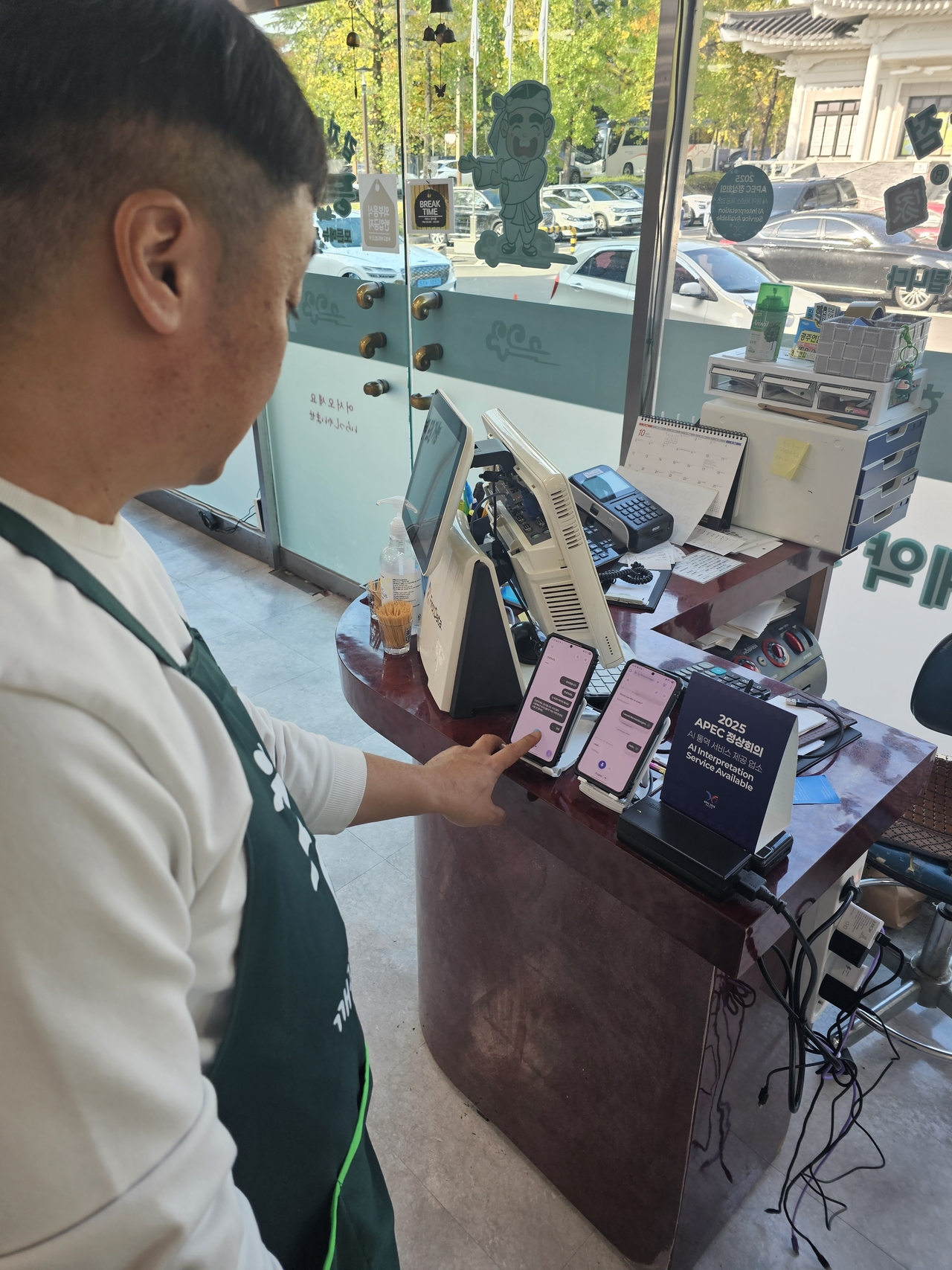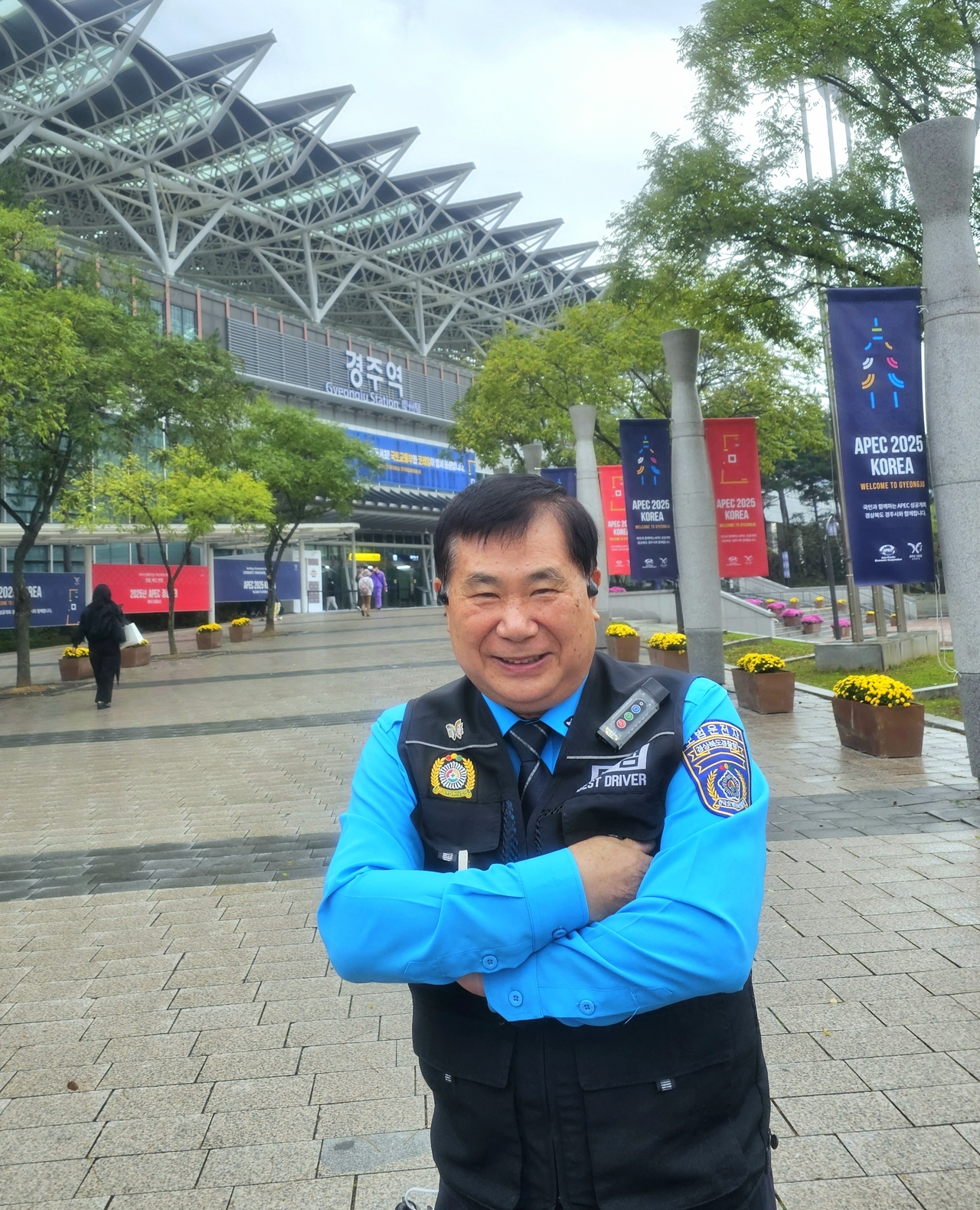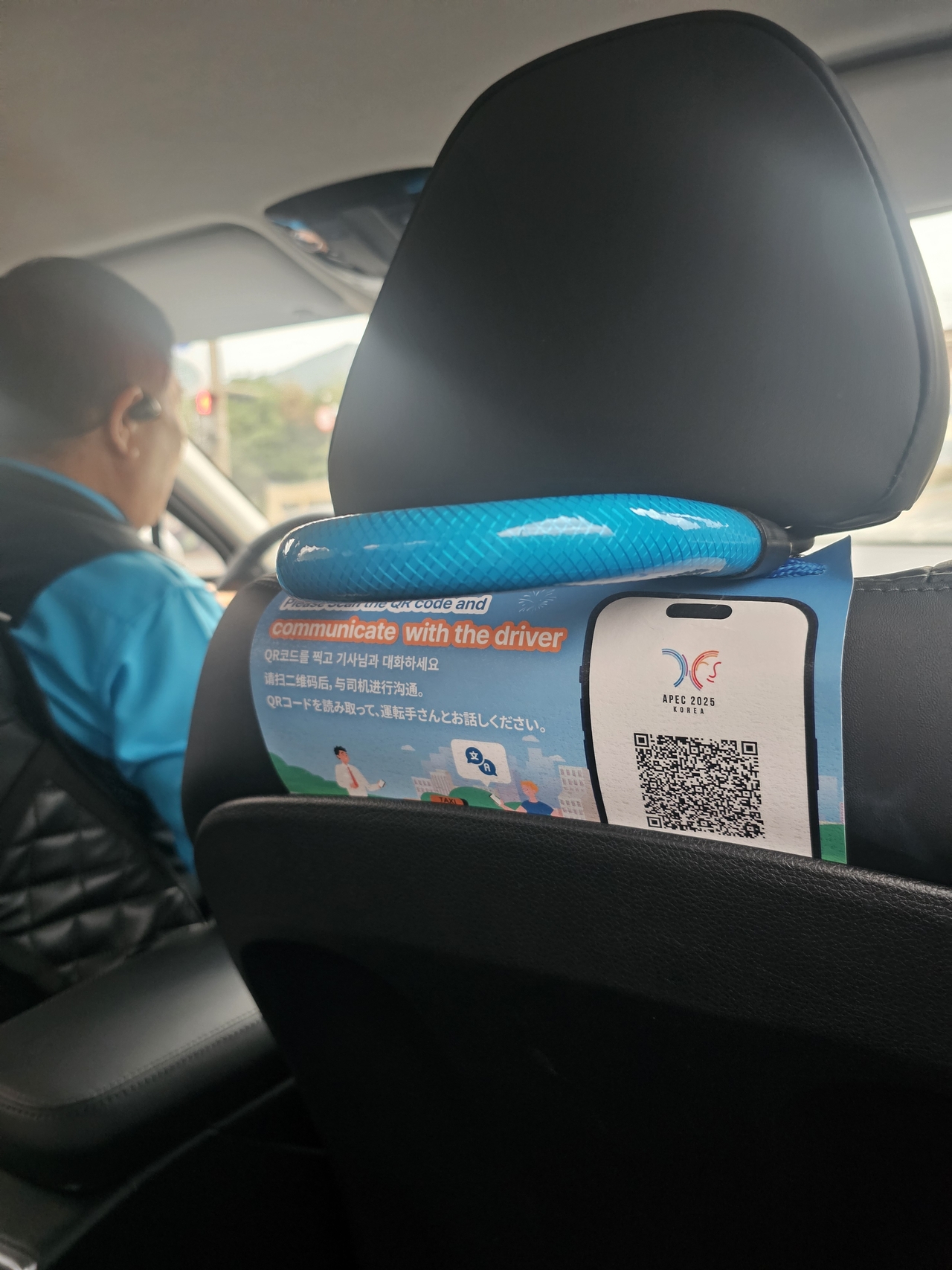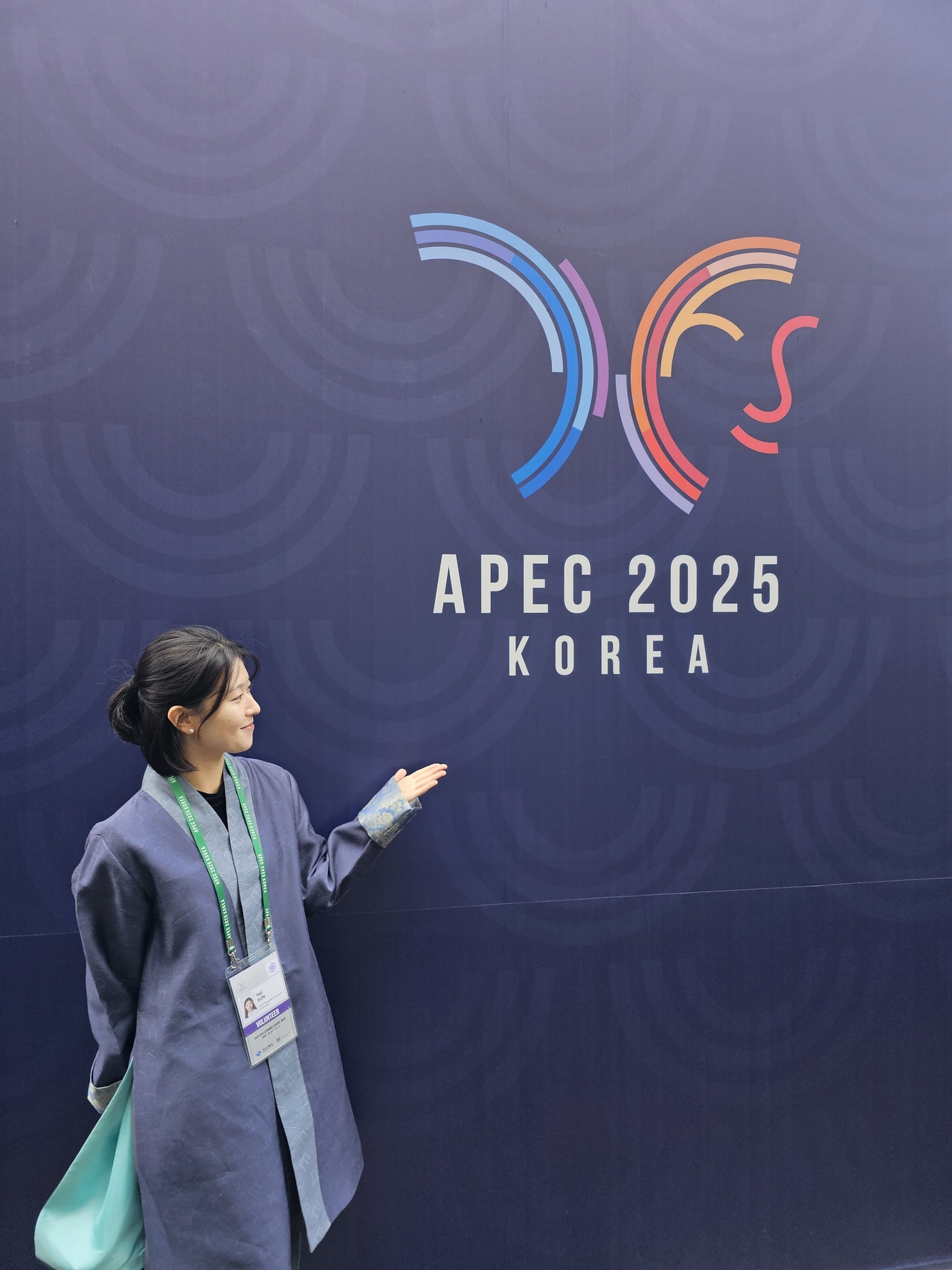October 28, 2025
GYEONGJU – Streets hum with life, as tourists weave among centuries-old relics and low-lying hanok buildings, while volunteers rehearse final preparations. Once the capital of the ancient Silla Kingdom, Gyeongju is alive with anticipation as it prepares to host one of the region’s major diplomatic events.
This week, Gyeongju will take center stage for the Asia-Pacific Economic Cooperation summit on Friday, marking South Korea’s second time in 20 years welcoming leaders and delegates from 21 member economies. US President Donald Trump is set to arrive here on Wednesday, followed by the leaders of China, Japan and many others on Thursday.
Roads surrounding the Gyeongju Hwabaek International Convention Center, or HICO, the main venue for the APEC summit on Friday and Saturday, were under tight security Sunday afternoon.
Groups of police cars and motorcycles patrolled the area in formation, while signboards notifying drivers of temporary traffic controls lined nearby roads.
Outside the convention center entrance, technicians checked LED display boards, while volunteers rehearsed protocol procedures at the information desk.
“All facilities are in place, and today we’re just focusing on the final checks and cleaning up around the venue,” a HICO official told The Korea Herald.
Around the Bomun Tourist Complex near the convention center, visitors are welcomed by banners and sculptures featuring the official APEC logo, inspired by a smiling roof-end tile from the ancient Silla Kingdom (57 BC-AD 935), when Gyeongju served as the capital.
Some restaurants in the complex were busy preparing to welcome foreign national visitors, equipped with AI-based translation devices provided by the APEC Summit Preparatory Committee to overcome language barriers.
When users speak Korean into a smartphone, even without an internet connection, their words are automatically translated into another language through a connected device. The devices currently support 37 languages.
“Many foreign customers these days use apps like Papago to translate on their own, but since we placed this device at the counter, they’ve started using it,” said Kong, 52, who runs a gamjatang (pork bone soup) restaurant in the area.

Kong demonstrates how to use the AI-based translation devices provided by the APEC Summit Preparatory Committee. PHOTO: THE KOREA HERALD
“I expect more foreign visitors to come starting Monday and hope to have small conversations with them through the devices, not just when paying the bill, but simple chats as well.”
The summit, which will bring together 21 national leaders along with top global business figures, is expected to create around 23,000 jobs and generate 7.4 trillion won ($5.3 billion) in economic impact, according to a joint study by the Korea Chamber of Commerce and Industry and consulting firm Deloitte.
Pamela, 45, from the United Kingdom, said she decided to visit Gyeongju during the APEC period after becoming fascinated with Korean historical dramas.
“I’m planning to visit various heritage sites as well as the APEC venue. Just walking around the streets here feels nice. The low, hanok-style buildings make the whole place feel antique and peaceful,” she said while strolling along Hwangridan-gil.
Diplomacy during this week isn’t just happening behind the closed doors of summit halls.
In taxis, restaurants and other tourist spots across the city, people are ready to offer their time, talents and warm smiles to help connect Korea with the world. The Korea Herald met some of them.

Park Sang-jin stands for a photo in front of Gyeongju Station, with APEC banners lining the street behind him. PHOTO: THE KOREA HERALD
Over the past six months, Park Sang-jin, 70, a taxi driver with 15 years of experience, chose not to drive at least once a week, instead volunteering in the street, wearing a reflective vest and holding a light baton.
He often headed to a busy intersection near Hwangridan-gil, a bustling shopping street, where he stood in the road using hand signals to direct cars that missed the light, warn illegally parked drivers and ensure pedestrians could cross safely.
“There have always been many tourists in the city, but the number of passengers has doubled in the month ahead of the APEC summit. With more cars on the road, I’ve been helping with traffic control whenever I can,” he said.
He is a member of the Gyeongju branch of the Exemplary Drivers Association, a volunteer group under the National Police Agency made up of about 26,000 experienced taxi, bus and private car drivers with no record of traffic violations.
These drivers assist local police with traffic control and enforcement on certain roads, receiving a small hourly stipend that falls below the minimum wage, and the association operates 261 local branches across 18 cities and provinces nationwide, according to Park.
“I’ve been volunteering for about 10 years now, so it’s just become part of my life. But with the APEC summit around the corner, I felt more responsibility to do my part for the country. I’ve been out there more often and for longer hours than usual,” he said.
Addressing negative perceptions of Korean taxi drivers among some foreigners — often tied to overcharging or unfriendly service — Park was determined to treat every passenger with sincerity, as someone representing his country.
“When foreigners arrive in Gyeongju, the first Korean they talk to might be a taxi driver. I want to do my best so they leave with good memories of the city,” he said.

A notice inside Park’s taxi guides foreign passengers to a QR code for real-time translation with the driver. PHOTO: THE KOREA HERALD
Meanwhile, the city government has introduced an AI-powered interpretation and translation system in about 1,000 taxis operating across the city.
When foreign tourists scan a QR code inside the taxi and download an app, they can say their destination in their native language, which is then translated into Korean for the driver. The driver’s explanations about the fare or route are also instantly translated into the passenger’s language.
An Indian and Pakistani chef has come from Busan to Gyeongju to run a special halal restaurant for Muslim visitors during the APEC week.
“Hi Asia” was opened Monday by the city government, which leased an existing Korean restaurant for three months, officials said.
Located about 10 minutes on foot from the HICO convention center, the restaurant will offer a variety of halal dishes in buffet style until Sunday. The term “halal” refers to food and other products that adhere to Islamic dietary laws.
Gondal Mubashar, who has run an Indian and Pakistani halal restaurant of the same name in Busan for 12 years, was selected as the head chef of the temporary halal restaurant in July, when the city held a public competition to find someone to manage the project.
From menu planning and ingredient sourcing to cooking and staff management, he oversees every aspect of the restaurant’s operations, receiving payment from the city for his work.
Stressing that food plays a huge part in tourism, he said that he hopes to help Muslim visitors enjoy a “tasty trip” in Korea.
“Halal food wasn’t easy to find when I first came to Korea in 2002, and it still isn’t today. Since people from around the world are gathering in Gyeongju for APEC, I wanted to do something to serve Muslim visitors,” he said.

A prayer room inside Hi Asia. PHOTO: THE KOREA HERALD
Hi Asia serves buffet-style halal meals, with different dishes offered each day for breakfast, lunch and dinner.
The restaurant operates from 7 to 9 a.m. for breakfast, noon to 2 p.m. for lunch, and 6 to 10 p.m. for dinner. Prices are 10,000 won ($6.90) for breakfast and 15,000 won for lunch and dinner.
A small prayer room near the entrance, furnished with rugs, prayer beads and other items, offers Muslim visitors a tranquil space to pray amid the city’s hustle and bustle.
“Food is at the heart of travel. A city-run halal restaurant shows that Korea and Gyeongju care about Muslim visitors, helping them feel more welcomed and enjoy their time here in comfort,” said Mubashar.

Son poses for a photo in front of a large APEC logo installation at Lahan Select, where the official APEC leaders’ dinner was held. PHOTO: THE KOREA HERALD
Currently, some 250 Korean volunteers have been deployed at major APEC event venues, hotels for leaders and tourists, and popular tourist spots across the city.
The volunteers, all aged 19 or older and from diverse backgrounds, were recruited by the city of Gyeongju in July through document screening and interviews, including online interviews for applicants overseas. Their duties range from interpretation and medical assistance to protocol support during APEC meetings.
Among them is Son Ye-ji, a student at Waseda University’s School of International Liberal Studies, who flew from Tokyo to join the volunteer team and plans to return home after APEC ends.
She was assigned to the information desk at the entrance of Lahan Select, where the official APEC leaders’ dinner will be held, assisting visitors with simple English and Japanese interpretation, guiding them to meeting rooms, and providing information about the hotel’s facilities.
“When you’re abroad, you always want to see your country do well in whatever it takes on. I wanted to contribute to this meaningful event as a Korean, and I’m excited because once I go back to school, this experience will give me plenty to talk about with my classmates from other countries,” said Son, who has lived in Japan for eight years.
Although she can’t provide the same level of expertise and detailed information as professional interpreters or APEC officials, Son believes that her warm smile and kind words can facilitate diplomacy with foreign visitors.
“I think of myself as a small diplomat while volunteering. The way we volunteers interact with foreign visitors can shape their impressions of Korea. I still remember the time I got lost in Japan and how kindly the locals helped me. That warmth has stayed with me to this day.”


